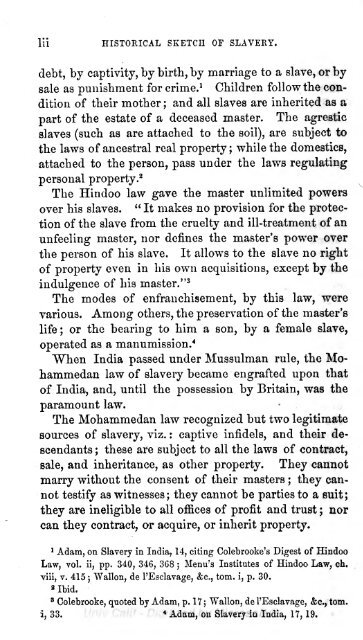Untitled - African American History
Untitled - African American History
Untitled - African American History
Create successful ePaper yourself
Turn your PDF publications into a flip-book with our unique Google optimized e-Paper software.
Ill HISTORICAL SKETCH OF SLAVERY.<br />
debt, by captivity, by birth, by marriage to a slave, or by<br />
sale as punishment for crime. 1<br />
Children follow the con-<br />
and all slaves are inherited as a<br />
dition of their mother ;<br />
part of the estate of a deceased master. The agrestic<br />
slaves (such as are attached to the soil), are subject to<br />
the laws of ancestral real property ; while the domestics,<br />
attached to the person, pass under the laws regulating<br />
personal property. 2<br />
The Hindoo law gave the master unlimited powers<br />
over his<br />
"<br />
slaves. It makes no provision for the protection<br />
of the slave from the cruelty and ill-treatment of an<br />
unfeeling master, nor defines the master's power over<br />
the person of his slave. It allows to the slave no right<br />
of property even in his own acquisitions, except by the<br />
of his master." 3<br />
indulgence<br />
The modes of enfranchisement, by this law, ^vere<br />
various. Among others, the preservation of the master's<br />
life; or the bearing to him a son, by a female slave,<br />
as a manumission. 4<br />
operated<br />
"When India passed under Mussulman rule, the Mohammedan<br />
law of slavery became engrafted upon that<br />
of India, and, until the possession by Britain, was the<br />
paramount law.<br />
The Mohammedan law recognized but two legitimate<br />
sources of slavery, viz. : captive infidels, and their de-<br />
scendants; these are subject to all the laws of contract,<br />
sale, and inheritance, as other property. They cannot<br />
marry without the consent of their masters ; they cannot<br />
testify as witnesses; they cannot be parties to a suit;<br />
they are ineligible to all offices of profit and trust ; nor<br />
can they contract, or acquire, or inherit property.<br />
1<br />
Adam, on Slavery in India, 14, citing Colebrooke's Digest of Hindoo<br />
Law, vol. ii, pp. 340, 346, 368 ; Menu's Institutes of Hindoo Law, ch.<br />
viii, v. 415 ; Wallon, de 1'Esclavage, &c., torn, i, p. 30.<br />
2 Ibid.<br />
8 Colebrooke, quoted by Adam, p. 17; Wallon, de 1'Esclavage, &c., torn,<br />
i, 33.<br />
4 Adam, on Slavery in India, 17, 19.


